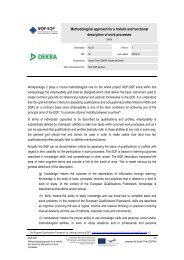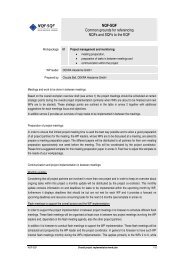Overview of National Qualification frameworks - Project-Nqf-Sqf
Overview of National Qualification frameworks - Project-Nqf-Sqf
Overview of National Qualification frameworks - Project-Nqf-Sqf
Create successful ePaper yourself
Turn your PDF publications into a flip-book with our unique Google optimized e-Paper software.
3.2 Access to education abroadForeign awarding bodies are widely represented in Malta, so learners do not have to travel abroad to achieve a foreignqualification. Education and Training providers have to be <strong>of</strong>ficially licensed by the Ministry <strong>of</strong> Education, Employment and theFamily.The University <strong>of</strong> Malta (1592) was one <strong>of</strong> the first Universities in Europe to introduce the European Credit System (ECTS)across all its faculties and centres with a few exceptions. The transparency <strong>of</strong> ECTS credits very much promoted by theBologna Process not only gives students opportunities for Erasmus exchanges but also to study abroad following completion <strong>of</strong>their studies in Malta.Although ECVET is in its early stages in the local institutions and there are no programmes such as the ERASMUS for highereducation students, opportunities for apprenticeship overseas do exist for VET students.Since the launching <strong>of</strong> the MQF in 2007 qualifications that are used as benchmarks in the MQF give a transparent value andvisibility to qualifications thus enhancing mobility <strong>of</strong> students.The Government <strong>of</strong> Malta awards the following sponsorship schemes to encourage mobility <strong>of</strong> students:__Malta Government Scholarship Scheme (MGSS) – targets undergraduate and post-graduate students;__Strategic Educational Pathways Scholarships (STEPS) – targets post-graduate students only__Malta Arts Scholarships (MAS) – targeting students with any level <strong>of</strong> studies.In the Netherlands the <strong>National</strong> Reference Point (NRP) Netherlands is the contact point for those in search <strong>of</strong> information onvocational education in the Netherlands and other European countries. The Dutch Ministry <strong>of</strong> Education has appointed Coloand Nuffic for this task. Colo and Nuffic together represent the national structure for credential evaluation in the Netherlands. Itis a close cooperation between Colo and Nuffic. Together they have established the Information Centre for CredentialEvaluation. Colo is the association <strong>of</strong> national Centres <strong>of</strong> Expertise for Vocational Education, Training and the Labour Market.Colo is responsible for credential evaluations at the level <strong>of</strong> senior secondary vocational education (mbo), including adulteducation, and preparatory secondary vocational education (vmbo). Nuffic is the Netherlands Organization for Internationalcooperation in higher education. Within the structure for credential evaluation Nuffic is responsible for evaluations on the level<strong>of</strong> general secondary education and higher education.The NRP based on the (EU) regulations and in close collobaration with the Ministry <strong>of</strong> Education is responsible for thoseaccreditions and definitions.There are several legal regulations and measures/mechanisms/tools/methods/practices within the formal education andtraining system in the Netherlands for easing access to education abroad:NRP Netherlands is part <strong>of</strong> the European network <strong>of</strong> NRPs. The objective <strong>of</strong> this network is to increase the transparency <strong>of</strong>national qualifications, which will promote the study and employment mobility within the EU. The website (www.nlnrp.nl) is thefirst step for finding information on vocational education in the Netherlands. It may also serve as a stepping-stone for findinginformation on, and making contact with, European partner organizations.There will be established a NCP NLQF. This NCP will have a national as an international role. At both levels it’s role will be toestablish confidence and trust.Speaking about access to education abroad, in Romania qualifications obtained abroad are recognised by the <strong>National</strong> Centrefor Recognition and Equivalence <strong>of</strong> Diplomas, authority within Ministry <strong>of</strong> Education. Pre-university diplomas and certificatesobtained abroad are recognised either or by applying knowledge tests/equivalence examinations/adaptation periods/studyperiods, depending on the differences between the Romanian and the respective foreign system.Higher education diplomas, certificates or scientific degrees obtained abroad are recognised after NCRED has acknowledgedthat the studies undertaken abroad are compatible with the study programme or qualifications in Romania, in terms <strong>of</strong>:__status <strong>of</strong> higher education institution issuing the diploma/certificate/degree__diploma level__number <strong>of</strong> study years/credits accumulated__study field__pr<strong>of</strong>ile__specialisation__curriculum/ workload /Diploma SupplementNQF-SQF:"This project has been funded with support from30/31<strong>Overview</strong> <strong>of</strong> <strong>National</strong> <strong>Qualification</strong>prepared by 3s research laboratory<strong>frameworks</strong>the European Commission. This publicationreflects the views only <strong>of</strong> the author, and theCommission cannot be held responsible for anyuse which may be made <strong>of</strong> the informationcontained therein."




